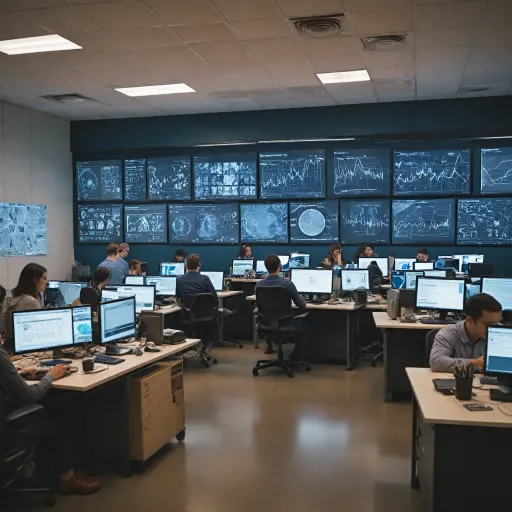
Understanding the impact of siop 2024 on HR analytics
Key Takeaways from the SIOP 2024 Congress for HR Analytics
The SIOP 2024 congress, known for its global impact in paediatric oncology, has brought together experts, industry leaders, and supporters from around the world. While the congress primarily focuses on childhood cancer and pediatric oncology, the event's scientific programme and annual sessions offer valuable insights for human resources analytics professionals. The international society's approach to data-driven decision-making, showcased through programme highlights and abstract submissions, is shaping the future of HR analytics in significant ways.
- Data-Driven Mindset: The SIOP annual congress emphasizes the importance of robust data collection and analysis, a principle that is increasingly relevant in HR. The scientific sessions demonstrate how data can inform strategic decisions, not only in oncology but also in workforce management.
- Global Collaboration: The international nature of the SIOP congress highlights the value of cross-border collaboration. HR analytics teams can learn from this model by fostering partnerships and sharing best practices across industries and geographies.
- Programme Innovation: The SIOP programme showcases advancements in technology and analytics, encouraging HR professionals to integrate similar innovations into their own practices. The focus on essential medicines and global health parallels the need for essential skills and well-being in the workforce.
- Continuous Learning: The congress offers CME CPD opportunities, underlining the importance of ongoing education. HR teams should prioritize continuous learning to stay updated on analytics trends and methodologies.
As organizations look to the future, the lessons from the SIOP congress can guide HR analytics towards more strategic, ethical, and impactful practices. For a deeper look at how global events like SIOP 2024 are influencing the future of HR analytics, explore this resource on how national career development initiatives are shaping HR analytics.
Integrating advanced analytics into HR decision-making
Driving Decision-Making with Advanced Analytics
The siop annual congress has consistently emphasized the transformative power of data-driven decision-making in human resources. As highlighted in the latest programme siop, HR analytics is no longer just about reporting metrics. It is about integrating advanced analytics into every stage of the employee lifecycle, from recruitment to retention, and even workforce planning. Recent sessions at the siop congress showcased how global organizations are leveraging predictive analytics and machine learning to anticipate workforce needs. For example, paediatric oncology departments are using data to forecast staffing requirements, ensuring essential medicines and care are always available for children with cancer. This approach, discussed in the scientific programme, is equally relevant for HR teams aiming to optimize talent management.- Programme highlights: The international society’s annual congress featured sessions on using analytics to identify skill gaps and improve employee engagement.
- Industry insights: Exhibitors and supporters demonstrated tools that connect HR data with business outcomes, making analytics more actionable for decision-makers.
- Global health perspective: The integration of analytics in paediatric and pediatric oncology was a key topic, underlining the importance of data in addressing workforce challenges worldwide.
Ethical considerations in HR data collection and analysis
Balancing Innovation with Responsibility in HR Data Practices
The siop congress and its annual programme highlights have brought renewed attention to the ethical dimensions of HR analytics, especially in sectors like paediatric oncology and global health. As organizations embrace advanced analytics, the need for responsible data collection and analysis becomes more urgent. The scientific programme at the siop annual congress often emphasizes the importance of protecting sensitive information, particularly when dealing with data related to childhood cancer or pediatric oncology professionals.
HR teams are increasingly tasked with handling large volumes of personal and sometimes sensitive data. This shift, accelerated by the international society’s focus on scientific advancements, requires a clear understanding of ethical boundaries. The global nature of the siop congress, with its diverse exhibitors and supporters, highlights the need for standardized ethical guidelines across regions and industries.
- Transparency: Employees must be informed about what data is collected, how it will be used, and who will have access. This is especially critical in international organizations participating in the siop programme.
- Consent: Obtaining informed consent is not just a legal requirement but a trust-building measure. The annual congress sessions often stress the importance of clear communication around data use.
- Bias and Fairness: Advanced analytics can unintentionally reinforce biases. Programme highlights from the siop congress underline the need for regular audits and the inclusion of diverse perspectives, such as those from young siop members or paediatric oncology specialists.
- Data Security: With the increasing use of essential medicines and sensitive patient data in paediatric oncology, robust security protocols are essential. The international society’s guidelines serve as a benchmark for best practices.
Industry leaders are also turning to real-world examples to guide their ethical frameworks. For instance, Toyota’s approach to human resource analytics demonstrates how global organizations can balance innovation with ethical responsibility. Their practices align with the principles discussed at the siop annual congress, offering a model for others to follow.
As the field evolves, HR professionals must stay informed about the latest ethical standards, whether through cme cpd sessions, abstract submission reviews, or by engaging with the promotional toolkit provided by the siop congress. Building a culture of ethical awareness is not just about compliance—it’s about fostering trust and integrity in every aspect of HR analytics.
The evolving role of HR professionals in a data-driven world
Adapting to a Data-Driven HR Landscape
The siop congress and its annual programme have made it clear: HR professionals are now expected to operate in a world where data is central to every decision. The scientific programme and highlights from the latest siop annual congress show that the integration of analytics is not just a trend, but a necessity for those working in paediatric oncology, global health, and beyond. This shift means HR teams must develop new skills and mindsets. The traditional focus on intuition and experience is being complemented by the ability to interpret complex data sets, understand predictive models, and communicate findings to stakeholders. The international society’s emphasis on scientific sessions and cme cpd opportunities reflects the growing demand for data literacy in HR roles.- HR professionals are increasingly collaborating with data scientists and IT specialists to design and implement analytics solutions tailored to workforce needs.
- Programme highlights from the siop congress underline the importance of continuous learning, especially in areas like essential medicines, pediatric oncology, and global workforce trends.
- Annual congress exhibitors and industry supporters are offering tools and training to help HR teams build their analytical capabilities.
Expanding Responsibilities and Opportunities
As the siop programme evolves, so do the expectations for HR professionals. They are now responsible for ensuring that analytics-driven decisions align with ethical standards, particularly when handling sensitive data related to childhood cancer or paediatric oncology staff. The international nature of the siop congress and its supporters highlights the need for HR teams to be aware of global regulations and best practices. The growing emphasis on data-driven decision-making also opens up new opportunities for career growth. HR professionals who embrace analytics can lead initiatives in strategic workforce planning, support international collaborations, and drive innovation in areas such as ipso and young siop programmes. To keep pace, HR teams should:- Engage with scientific sessions and abstract submission opportunities at events like the siop annual congress.
- Utilize promotional toolkits and book hotel packages early to maximize participation in global HR analytics events.
- Join siop and similar organizations to stay updated on the latest programme highlights and industry developments.
Leveraging siop 2024 insights for strategic workforce planning
Translating siop congress insights into actionable workforce strategies
The siop annual congress is a central event for the international society of pediatric oncology, bringing together global health experts, industry exhibitors, and supporters to discuss the latest scientific programme highlights. While the focus is often on paediatric oncology and childhood cancer, the programme siop offers valuable lessons for HR analytics professionals seeking to enhance strategic workforce planning. One of the key takeaways from the siop congress is the importance of leveraging data-driven insights for future workforce needs. The scientific sessions and abstract submissions showcase how oncology teams use advanced analytics to predict patient outcomes, optimize resource allocation, and improve care delivery. These same principles can be applied in HR to anticipate talent gaps, manage succession planning, and align workforce capabilities with organizational goals.- Programme highlights: The siop programme emphasizes the integration of essential medicines and global health perspectives. For HR, this translates into understanding the broader context of workforce trends, such as remote work, diversity, and international mobility.
- Annual congress learnings: The collaborative environment at the annual congress encourages sharing of best practices. HR leaders can adopt similar approaches by fostering cross-functional teams and promoting continuous learning within their organizations.
- Industry and exhibitors: The presence of industry partners and exhibitors at siop highlights the value of external collaboration. HR analytics teams can benefit from partnerships with technology providers and data experts to enhance their analytical capabilities.
Practical steps for HR analytics teams
To effectively leverage siop 2024 insights, HR professionals should focus on:- Building robust data collection and analysis frameworks that mirror the scientific rigor seen in oncology research.
- Encouraging participation in international programmes and cme cpd opportunities to stay updated on global workforce trends.
- Utilizing promotional toolkit resources to communicate the value of analytics-driven workforce planning to stakeholders.
- Supporting young siop and early-career professionals by creating skill-building pathways and mentorship programmes within HR teams.
Building a culture of data literacy in HR teams
Developing Data Skills Across HR Teams
Building a culture of data literacy in HR teams is essential for organizations aiming to leverage the latest insights from the siop congress and its annual programme highlights. As the global focus on paediatric oncology and childhood cancer continues to grow, HR professionals in healthcare and beyond must understand how to interpret and act on scientific data. The international society’s annual congress sessions and scientific programme emphasize the importance of equipping HR with the right analytical skills.
- Continuous Learning: Encourage participation in workshops, online courses, and sessions offered by the siop annual congress or similar industry events. These programmes often cover topics like essential medicines, global health, and the latest in pediatric oncology analytics.
- Practical Application: Integrate real-world data projects into daily HR activities. For example, analyzing workforce trends from abstract submission data or evaluating the impact of promotional toolkit initiatives can help teams practice their skills.
- Cross-Functional Collaboration: Foster partnerships between HR, IT, and scientific teams. Joint sessions at the siop congress and international industry events highlight the value of diverse perspectives in data-driven decision-making.
- Accessible Resources: Provide easy access to the siop programme, session recordings, and book recommendations. This supports ongoing learning and ensures HR teams stay updated with global highlights and best practices.
- Recognition and Support: Celebrate achievements in data literacy, whether through internal awards or by supporting attendance at the next annual congress. Recognizing progress motivates teams to keep developing their skills.
Embedding Analytics in HR Culture
To truly benefit from the scientific advancements and programme highlights shared at the siop congress, organizations must embed analytics into their HR culture. This means making data-driven thinking a core part of every HR process, from talent management to strategic workforce planning. By joining siop events, engaging with global exhibitors, and utilizing cme cpd resources, HR teams can stay at the forefront of international best practices in paediatric and pediatric oncology analytics.
Ultimately, fostering a data-literate HR team is not just about technical skills. It’s about creating an environment where curiosity, critical thinking, and ethical considerations are valued. This approach ensures that HR professionals are ready to navigate the evolving landscape shaped by the latest siop congress insights and the broader scientific community.













